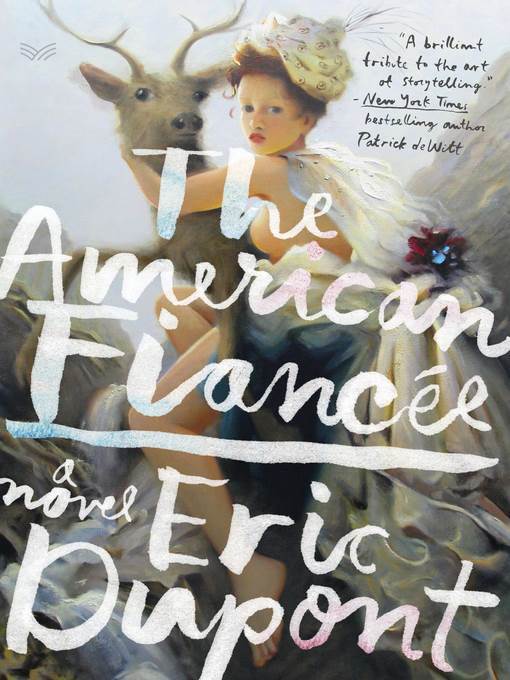
The American Fiancée
A Novel
کتاب های مرتبط
- اطلاعات
- نقد و بررسی
- دیدگاه کاربران
نقد و بررسی

Starred review from December 1, 2019
French Canadian Dupont's bruiser of a novel begins as a traditional family saga set in a small, early-20th-century Quebec village before swerving into new, less linear, and more psychologically demanding territory. Born in 1918 and almost immediately orphaned, larger-than-life figure Louis Lamontagne grows up with his grandmother Madeleine, a powerhouse herself, in Rivière-du-Loup. The names Louis and Madeleine will recur among other characters, as will a birthmark shaped like a bass clef and blue eyes in a particular shade of teal. Louis' nickname, "The Horse," is his alone, however, derived from his mythic strength. Womanizing, storytelling Louis' life is by turns rollicking and tragic. He evolves from a charismatic, beloved boy to a witness to World War II atrocities to an alcoholic funeral director after his youngest son dies in a tragic accident. His middle child, Madeleine, eventually takes center stage. As a pregnant, unmarried teenager, she moves to Quebec City in the 1960s and opens a diner that she expands into a hugely successful chain while raising twin sons, Michel and Gabe. This first half of the novel, chock full of digressive stories about seemingly minor characters, has a rambling, overstuffed, 19th-century feel. But then, more than 250 pages in, Dupont shifts gears; the novel narrows and becomes epistolary. In 1999, Gabe, on a hopeless romantic quest in Germany, and Michel, an opera singer making a controversial film version of Tosca in Rome, begin a correspondence expressing their ambivalence toward each other and their conflicting views of their mother. Meanwhile, Gabe meets an elderly German woman with a convoluted story she shares in notebooks that take Gabe and the reader in unexpected directions. Everyone's version of events differs here; there's no trusting who's hero, victim, or villain--or what's real; parallels accumulate; every casually mentioned detail becomes important as truths are revealed. While the intensity of Dupont's prose can be maddening, the sweet, sour, and salty world he creates is thoroughly addictive.
COPYRIGHT(2019) Kirkus Reviews, ALL RIGHTS RESERVED.

January 20, 2020
Canadian author Dupont (Life in the Court of Matane) spins an unwieldy yarn spanning from the 1918 Spanish flu pandemic in rural Quebec to Rome in the early days of the new millennium. In 1918 Rivière-du-Loup, Canada, Louis Lamontagne is born during a live nativity scene to an American mother. Louis, nicknamed “the Horse” due to his size, is raised by his grandmother Old Ma Madeleine and grows into a strongman performer, touring county fairs in America. He then enlists during WWII, participates in the liberation of Dachau, and returns to the U.S., where he marries a local girl and becomes a washed up drunk. Moving forward to the mid 1960s, his daughter, Madeleine, is embarrassed by Louis and devotes her energy to her twin sons. The second half of the story follows the different paths of the twin boys: Gabriel becomes a muscled seducer of women (unknowingly in his grandfather’s vein) and moves to Berlin; Michel becomes a world class opera singer, filming a new version of Puccini’s Tosca in Rome. As the novel accelerates toward the finale, the disparate threads interweave heavy-handedly with the characters converging on the Roman film set. While jam-packed with family secrets and deceptions, Dupont’s sprawling tale also risks reader exhaustion. Those who enjoy sprawling family sagas and are willing to put in the work will find this outing has its rewards.

Starred review from January 1, 2020
Early in the twentieth century, the titular American fianc�e, Madeleine, arrives in the remote Quebecois town of Rivi�re-du-Loup to wed Louis-Benjamin in accordance with her family's wishes. That marriage will spawn generations of teal-eyed descendants, starting with Louis the Horse Lamontagne, whose penchant for gin-fueled stories drives much of the early part of this immensely entertaining and fluidly translated novel. While ordinary love is cruel, Puccinian love is merciless, says Solange, a family friend. Indeed, the Puccini opera Tosca occupies prime real estate as its plot shapes this multigenerational epic that zooms in and out of individual characters' lives. Looping from small-town Canada to Montreal, the action reaches to Nazi Germany and contemporary Europe. If at times key pivot points depend too conveniently on coincidence, Dupont's spellbinding tale nevertheless spectacularly drives home the wonders of long-form storytelling. Stories, Michel, they're good for kids, but then one day you grow up and you've got adult problems, says the Horse's daughter, Madeleine, dismissively. She's got a point, but when we shed our mortal skins, our stories are all that we leave behind. Through his characters, Dupont has woven a memorable one.(Reprinted with permission of Booklist, copyright 2020, American Library Association.)

























دیدگاه کاربران